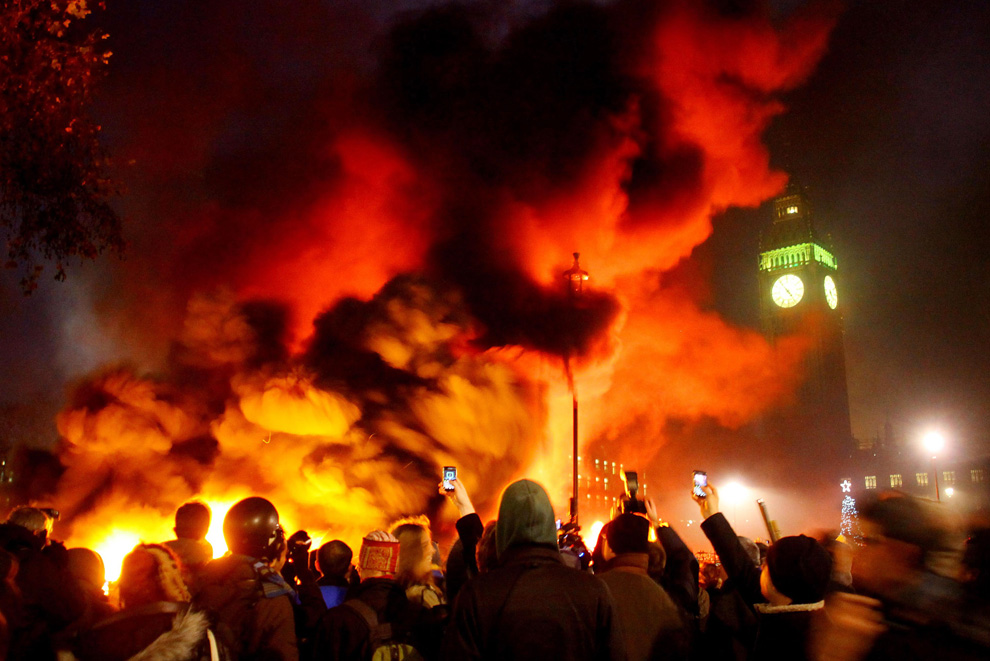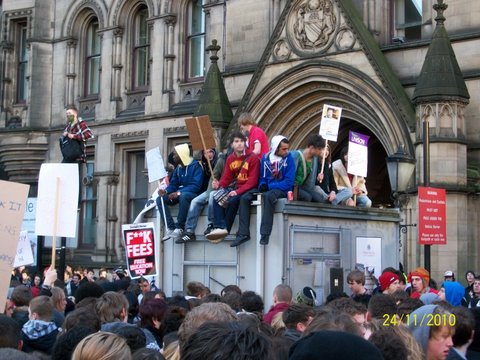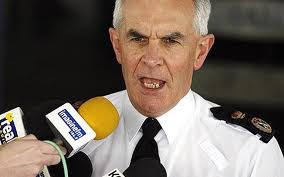GMP Chief joins anti-protest propaganda war
Article published: Monday, January 10th 2011
The Chief of Greater Manchester Police has weighed into the propaganda war against the student protests – and he has the local media in tow.
Before the end of 2010, Greater Manchester Police (GMP) Chief Constable Peter Fahy released a statement to the press in which he claimed that each day of the student protests was costing the force £100,000. He also warned that this “clearly has a knock-on effect for the rest of the force in terms of dealing with other incidents and regular policing of communities.”
While many Greater Manchester residents may be bemused by Fahy’s claims considering some of the more questionable ways GMP spends public money, squabbling over numbers misses the political motive behind his statement. For with these words Fahy joined the chorus of voices seeking to delegitimise the student movement and, in turn, the wave of protests expected this year as the painful effects of the coalition’s cuts rip through the country. By equating the deployment of police resources with negative consequences for communities – or, as he said “[t]o put it bluntly, officers policing protests are not chasing burglars” – Fahy is trying to pit ‘ordinary’ members of the community against students, as if their interests were completely opposed. In one stroke he simultaneously obscures the political nature of the protests, and their intimate connection with the futures of the communities his force supposedly protects.
Fahy’s comments reveal one of the political functions of the police in a time of crisis – which is to protect a government carrying out unpopular measures and extinguish mass dissent. This is heard no more clearly than in his warning of where resources will be diverted: “I want to stress…if these types of protests are going to become more common there is an impact on local policing.”
Through his statement, Fahy is merely following in the footsteps of the London Metropolitan Police who have attempted to discredit protestors and dampen support for the movement through two approaches to public relations. The first, following the sacking and occupation of Tory HQ at Milbank, was to blame the disorder on a renegade gang of ‘anarchists’ who ‘hijacked’ the main, peaceful march. That many of those doing the ‘smashing’ were unmasked teenagers made it abundantly clear that this was not an embedded group of professional nihilists. The fictitious distinction between ‘anarchists’ and students was an attempt to strip those who participated of their own agency, patronising the popular rage which led to the spontaneous and mass action.

Student protest in Parliament Square 9 December
After the second large protest in London on December 9 this line clearly became untenable. The Met then tried another avenue through their announcement that most of those arrested at the protests were first-time offenders. The intention here was to convey a seeming sense of stern sympathy – “they are not really bad, just a little angry and misguided” – and to thereby rob the protestors of the force of their actions, though Police Commissioner Sir Paul Stephenson’s statement that student protests might need to be banned outright seemed to say more of the Met’s real attitude towards dissent.
In light of these PR games the statement of the GMP chief is hardly surprising; but what is shocking is the total absence of any critical comment in the local media regarding his intervention. Fahy’s comments were faithfully regurgitated across most Greater Manchester news platforms including Manchester Evening News, Rochdale Online, Oldham Evening Chronicle, Matlock Mercury and InsidetheM60 among others. All of these carried his statement but nowhere was his claim questioned or the reasons behind it. The only outlet which appears to have read between the lines was Manchester Confidential, which reached the conclusion that “it’s clear the Chief is making a point” by drawing a link between Fahy’s statement and the recent announcement of 3,000 job losses caused by a £134m government cut to the GMP budget.
The absence of any critical reflex from the rest of the local media in regards to Fahy’s statement confirms a trend of the reporting of student demonstrations in Manchester. Despite a MULE investigation which collected over a dozen eyewitness accounts of violence and intimidation at the hands of police on November 24 – and video footage which unequivocally shows officers on horseback charging at protestors – not a single news outlet in the region picked up on what had actually happened. In the aftermath of the event, a GMP spokesperson told MULE that there was “nothing from our side to suggest that [the horse charge] happened.” It was this police version of events which was universally accepted.

Student protest outside Manchester Town Hall on 24 November
Nor was it reported anywhere that on the same demonstration the GMP had unilaterally changed the route of the march, and that over 2,000 protestors spontaneously broke out the police cordon on route to Castlefield and made their way to the original destination of the Town Hall, as police desperately tried to regain control. Instead we were treated once again to the parroted official line of a “largely peaceful protest with a few arrests“; yet again a deliberate attempt to dispossess the protest of its political force and the repercussions this would create in the media.
Both incidents illustrate how when it comes to reporting contentious matters such as protest, the relationship between the police and the press in Greater Manchester operates by simple mechanism of open wide and swallow, with not so much as a gag reflex. What are the possible explanations for this – an absence of a culture which encourages critical reporting in journalism? A lack of resources twinned with commercial pressures making investigative journalism near to impossible? Pressure from political institutions?
All contribute in varying degrees and in interconnected ways; however another, more subtle factor is the very relationship between the press and the police. Read the Manchester Evening News on any given day and you’ll see how reliant the local media and crime reporters are on GMP’s press office for stories. This gives the force an enormous amount of power over what is deemed ‘newsworthy’, as demonstrated by the number of barely altered press releases which make it into the news (what Nick Davies calls ‘churnalism‘).
Repeatedly challenging the official line is unlikely to gain a journalist favourable access and inside scoops on those sensationalist drug raids, while hearing one side of a carefully vetted story day after day doesn’t exactly sharpen a journalist’s critical faculties. Though it would be too strong suggest that an equivalent to the ‘embedded journalism‘ of war correspondents exists in Greater Manchester between press and police, you have to ask how far reporters will go when it might endanger the snug relationship which gets them inside GMP briefing rooms?
The package of violent cuts planned by the coalition government will affect Manchester disproportionately and is likely to trigger even more social unrest in the coming months. This will include protest and inevitably confrontation between the state and the subjects it is waging social war upon. In the times ahead it is imperative that there is a critical attitude taken by local media towards the state – especially its iron fists, even if it has only taken off one kid glove for the time being.
Michael Pooler and Andy Lockhart
More: Cuts, Education, Features, Opinion, Policing
Comments
-
The protest policing is a complete waste of money, but it’s not the protesters’ fault. There were 30 vans parked on Brunswick Street alone at the last big demo in Manchester, which means about 250-300 coppers present. All the students wanted to do was march to the Town Hall.
The repeated use of horses is also interesting, since there are going to be cuts to individual cities’ stables, after which they will be organised regionally instead. The police are needlessly (and dangerously) using them in the hope that they’ll be retained.
If the cops keep behaving the way they have, some kid somewhere in the country is going to get killed just so a few of these stupid twats can keep their jobs.
Comment by Abel on January 10, 2011 at 6:49 pm -
‘The package of violent cuts planned by the coalition government’
Violent cuts?
How are the spending cuts ‘violent’? They consist mainly of sacking public sector workers. How is that violent?
Comment by simon on January 11, 2011 at 8:19 pm -
I think the word violent was meant as a metaphor. In the same vein one could say “jarring cuts” and not expect anyone to be thrown forwards in their seats.
Comment by bill on January 11, 2011 at 10:20 pm -
it depends on what kind of violence you are referring to: http://standagainstcuts.files.wordpress.com/2010/11/towerfin.jpg
Comment by Red Mick on January 11, 2011 at 10:39 pm -
‘Violent’ was a poor word to use, but then the whole article is poor.
There’s never going to be much interest from the press or the public about a few students having a demo which results in no serious injuries or damage.
The authors seem to forget that people expect students to demonmstrate from time to time, and also that the fees rise is welcomed by many people. It means that students will pay their own fees, and not them.
Comment by simon on January 12, 2011 at 2:24 pm -
About time this younger generation got off their lazy back sides and did a bit of direct action.
Comment by Jenks on January 13, 2011 at 11:45 pm -
Yes, it’s churnalism, but it suggests that the students aren’t being properly represented by their union. The NUS are almost invisible and are losing the PR war for them.
Btw, all of those Manchester news outlets use the same content — let me guess… All owned by MEN Media?
Comment by Drunkenoaf on January 30, 2011 at 2:46 pm
The comments are closed.




